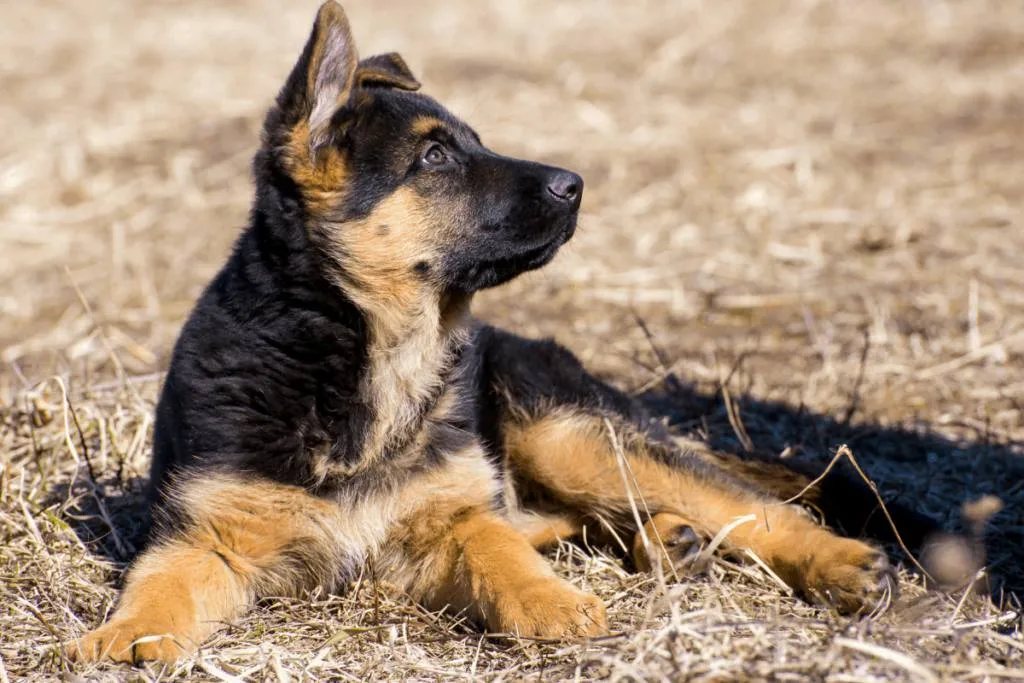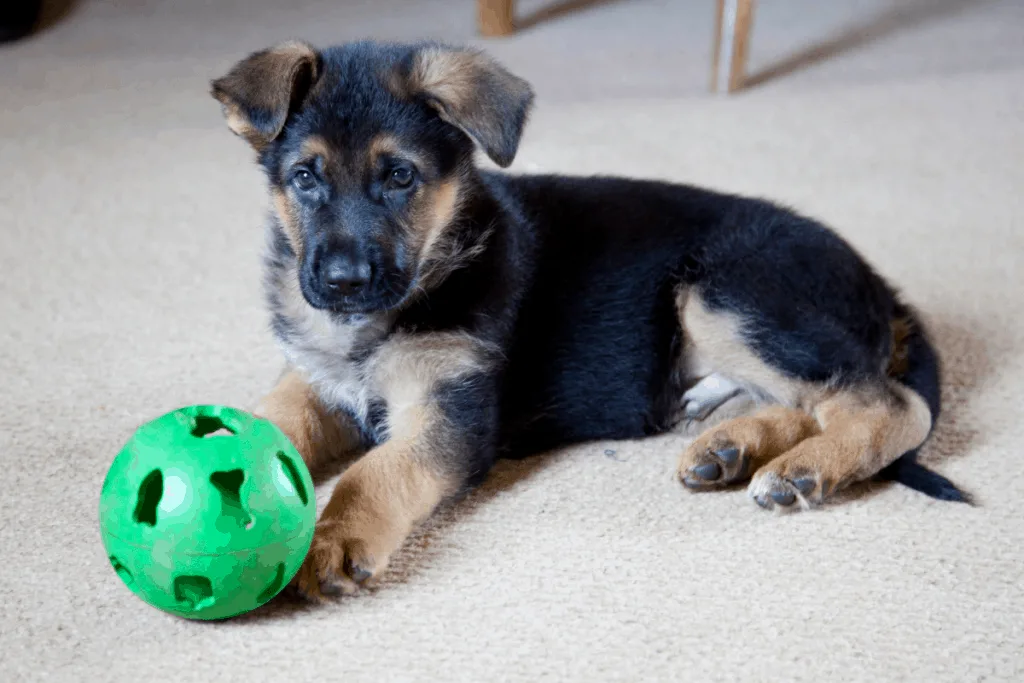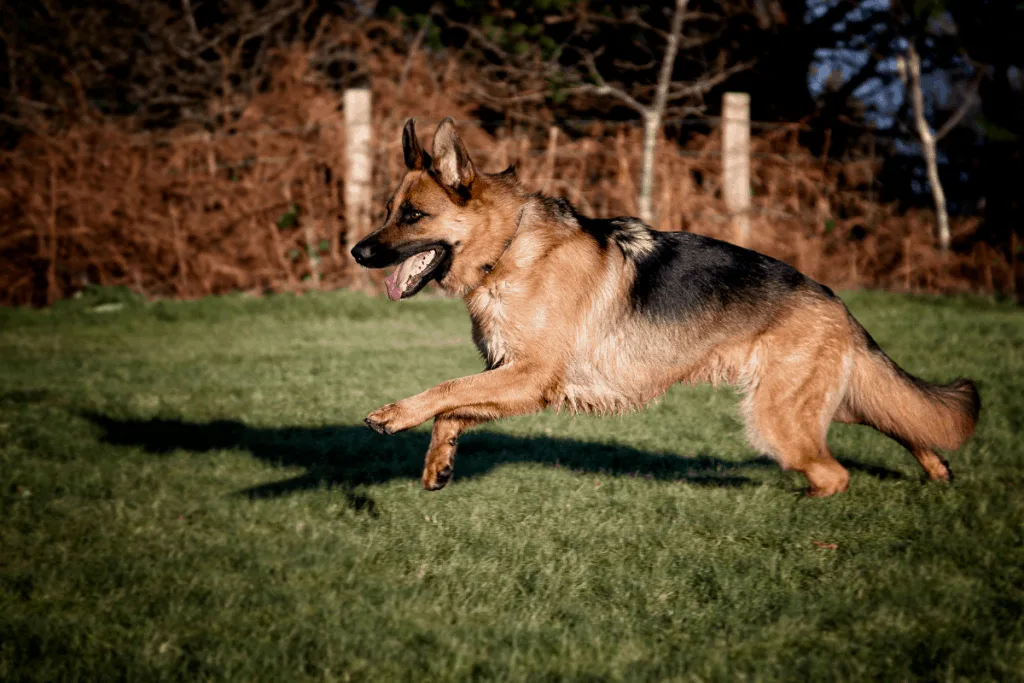
German Shepherds are fiercely loyal, wonderful family dogs that are protective, playful, and energetic. However, due to their sheer size and intimidating nature, owners worry about bringing their German Shepherds around small dogs. This concern leads to an important question; will my German Shepherd be good with small dogs?
Whether or not your German Shepherd will be good with small dogs depends heavily on their socialization and training. By understanding your German Shepherd’s personality, including what triggers unwanted behavior, you can successfully introduce small dogs into the picture. Proper socialization ensures German Shepherds will get along with smaller dogs.
Click Here to Jump to a Section
How to Make it Work Between Your German Shepherd and Small Dogs
German Shepherds can be threatening due to their size and demeanor. But that doesn’t mean they can’t get along with small breeds of dogs.
It’s all about how they are socialized as puppies or trained as adults.
Socializing your German Shepherd to be Around Smaller Dogs
Proper socialization can mean the difference between your German Shepherd getting along with a small pooch or becoming aggressive.
Here are a few helpful tips to make sure your German Shepherd is properly socialized:
1. Socialize Your German Shepherd as a Puppy
Ensuring your German Shepherd is properly socialized as a puppy is your best bet if you want him to be calm, collected, and well-behaved.
By introducing your German Shepherd puppy to dogs (and people!) of all sizes and shapes, he is much more likely to be well-adjusted around any size dog, including small dogs.
He will learn that small dogs are a normal part of everyday life and are not to be feared.
2. Socialize Your German Shepherd with Other Small Dogs
Make it a priority to socialize your German Shepherd with small breeds of dogs.
- Invite friends with small dogs over for a playdate. Be sure to take it slow by introducing your pups on leashes, letting them sniff each other.
Once they are friendly and comfortable with each other, you can let them play. - Take your GSD on frequent walks and try to introduce him to as many small dogs as possible.
If your neighborhood doesn’t have many small dogs out and about, consider taking your dog on a hike or nearby trails.
3. Socialize at the Dog Park
Many owners enjoy taking their German Shepherd to the dog park. However, you need to make sure that your GSD is comfortable with dogs of all sizes.
The owners of small pups don’t want to have to deal with your GSD growling or charging their sweet five-pound doggy – that would be terrifying for all involved!
Make sure to follow these steps to make sure that your German Shepherd is ready to enter the dog park:
- First and foremost – do not let your German Shepherd off of the leash during the very first trip to the dog park.
It’s best to keep him on the leash and outside of the fence the first go-round.
Use the fence as a protective barrier so your GSD can get to know all of the other dogs safely.
Specifically, focus on small dogs so that he can become comfortable with the size difference. - Once your GSD shows that he can remain calm and well-behaved, keep him on the leash and let him sniff and explore inside of the dog park.
Again, make sure to introduce him to small dogs. If he shows he can be friendly and mild-mannered, it’s time to let loose and have fun!
Once your GSD is appropriately socialized in a dog park setting, he should do great with small breeds at the dog park!
However, always keep in mind what triggers your GSD to show aggression so that you can prevent any issues with other dogs and their owners before they happen.
Potential Conflicts and How to Prevent Them
Recognizing any potential conflicts can ensure that your German Shepherd gets along with small dogs.
As we just mentioned, it is best to take the proper steps and precautions to prevent aggression issues rather than dealing with them after the fact.
Size Matters – Can Your GSD Hurt a Small Dog?
Adult German Shepherds are medium to large, weighing anywhere between 50 to 80 pounds.
Even the most well-behaved German Shepherd has the potential to unintentionally hurt a small dog – simply due to the sheer size difference.
German Shepherds can accidentally paw or rollover on small dogs. They can also playfully nip, only to end up hurting a much smaller pup.
Because GSDs of the size difference, it’s vital to monitor playtime between them and small dogs.
Get Inside Your German Shepherd’s Mind
Before introducing your German Shepherd to a small dog, it’s crucial to understand how he thinks.
GSD’s have personalities just like people. They have likes and dislikes and are bothered by certain things.
Understanding what causes your German Shepherd to become agitated or aggressive will ensure that you are well prepared when your big dog meets a small dog.
For instance, maybe something negative happened to your German Shepherd in the past.
- A smaller dog could have bullied your German Shepherd puppy, causing him to instinctively become aggressive when encountering a dog of similar size.
- Or maybe your German Shepherd has a favorite toy. A small dog snatched up that toy, and your GSD remembers this horrible incident. Now, he holds a grudge against any little dog that gets in the way of him and his precious toy.
These are times that you know will cause stress, agitation, and aggression in your German Shepherd.
Remove any of his beloved toys and make sure he doesn’t feel cornered in any situation to prevent aggression and anxiety.
By being proactive, you can prevent your German Shepherd from acting out around small dogs.
Bringing Home a Small Dog

You bring home a new family member: a small dog – the opposite of your sizeable German Shepherd. You’ve done your homework, and the breed should get along well with your GSD.
Nothing could go wrong, right?
Well, right and wrong. While some breeds of dogs are known to get along, it doesn’t necessarily mean that your GSD and new small pup will.
Dogs all have different, unique personalities and traits; when they get together, it can be fantastic or disastrous, no matter their size.
Being Alone Together
You should not leave your German Shepherd alone with your new small pup until you know that they are comfortable with each other and will behave appropriately.
Leaving your GSD unattended with a small dog can lead to serious unwanted consequences for the smaller dog.
If you are not present and are still not entirely sure how your GSD and a new puppy will get along, it is important that you keep them separated.
Many owners find that using a crate is an effective solution, and crate training a German Shepherd puppy is something that you should consider doing anyway.
This way, your adult GSD and your new puppy will still be able to interact while ensuring your puppy’s safety.
Should you choose to crate train your pup, it is important that you get a crate large enough to accommodate him as he grows at a rapid pace.
When crated, a dog should have just enough room to comfortably lie down. If a puppy has too much available space in his crate, he may actually injure himself.
A good quality crate, like Midwest Homes iCrate, come with a divider that allows for you to adjust the space available for your GSD as he grows.
A Small Dog May Cause Your GSD Anxiety
Just like people, German Shepherds can suffer from anxiety.
Bringing home a new (tiny!) dog means a change in your GSD’s environment, which can actually trigger anxiety in your GSD.
Consider all of the changes that your German Shepherd may possibly experience by adding a new doggie family member.
You can do your part by helping your GSD stick to his routines by following these guidelines:
- Make sure to keep your dog’s feeding schedule consistent. Do not deviate from his regular schedule.
- Stay with your dog’s current walking schedule. Gradually include your new puppy on walks with your adult GSD.
- Do not focus all of your attention on your new puppy. Make sure to shower your adult GSD with affection so that he doesn’t feel neglected.
Even the slightest change in your German Shepherd’s environment can lead to anxiety and, ultimately, aggression towards your new small pup.
Remember that your German Shepherd is used to a specific way of life, and your new little friend doesn’t know the difference.
Things are bound to change when you bring home a new family member, but try to stay on the same routine with your German Shepherd to ensure he does not feel threatened.
Resource Guarding
German Shepherd can show possessive behavior, especially when a new little dog comes waltzing into their territory.
Possessive behavior, also called resource guarding, is typically displayed with toys, food, or anything your German Shepherds considers valuable.
This behavior can be avoided by simply removing any items your GSD considers valuable.
How to Ensure a Smooth Transition
There are ways to make sure that your German Shepherd and your newest, smallest family member get along.
If you can, introduce your GSD and new pup on neutral territory, and make sure they are both on leashes so you can control them.
Once the dogs seem relaxed around each other, you can take them off of their leashes and let them just be. This playtime should ideally happen outside in your yard.
At bedtime, keep your GSD’s sleeping arrangements the same. The new little doggie doesn’t know the difference, so keep your adult GSD happy while making your new pup comfy as well.
GSDs are protective and loving. A small dog could be their new best friend or worst enemy.
That said, GSDs need to be properly socialized and trained using positive reinforcement to make sure they get along with small dogs.
- Note any aggressive behaviors, such as growling or staring. Remove your German Shepherd from the situation if these behaviors do not improve over time.
- Make sure to watch over any interaction between your GSD and a smaller dog in the beginning.
Keep their playtime simple at first, avoiding any stimulation that could be distracting, such as children or loud music. - Most importantly, be patient. It takes time for dogs of any size to become accustomed to each other.
Knowing how to socialize your GSD and being calm and patient will lead to a successful relationship for you, your GSD, and your tiny new pup.
If all else fails, don’t give up, and consider calling in a professional dog trainer.
Exercise for German Shepherds vs. Smaller Dogs

German Shepherds are highly energetic dogs who need a lot of exercise. Your new tiny furry friend might not need a lot of movement, but a German Shepherd craves it.
Typically, GSD’s need at least 45 minutes of exercise a day. German Shepherds are workhorses. They were bred for herding sheep and yearn to be on the move.
A smaller breed or a puppy might need less than 30 minutes of exercise a day, and less overall stimulation.
Without enough exercise, German Shepherds might use that pent up energy in undesirable ways. Add a small dog into the picture, and that could be a dangerous situation.
Final Thoughts
Whether you are bringing a little dog into the home as a new pet or you or around friends or at the dog park with smaller dogs, there are ways to train your German Shepherd so that he can successfully play with small dogs.
Ensuring that your German Shepherd puppy is properly socialized will make a world of difference when introducing him to a smaller breed.
Keep in mind that there are inherently dangerous situations when letting a large breed hang out with a small dog breed or a puppy. Still, with careful training and supervision, it is absolutely doable.

